HSBC 2002 Annual Report Download - page 260
Download and view the complete annual report
Please find page 260 of the 2002 HSBC annual report below. You can navigate through the pages in the report by either clicking on the pages listed below, or by using the keyword search tool below to find specific information within the annual report.-
 1
1 -
 2
2 -
 3
3 -
 4
4 -
 5
5 -
 6
6 -
 7
7 -
 8
8 -
 9
9 -
 10
10 -
 11
11 -
 12
12 -
 13
13 -
 14
14 -
 15
15 -
 16
16 -
 17
17 -
 18
18 -
 19
19 -
 20
20 -
 21
21 -
 22
22 -
 23
23 -
 24
24 -
 25
25 -
 26
26 -
 27
27 -
 28
28 -
 29
29 -
 30
30 -
 31
31 -
 32
32 -
 33
33 -
 34
34 -
 35
35 -
 36
36 -
 37
37 -
 38
38 -
 39
39 -
 40
40 -
 41
41 -
 42
42 -
 43
43 -
 44
44 -
 45
45 -
 46
46 -
 47
47 -
 48
48 -
 49
49 -
 50
50 -
 51
51 -
 52
52 -
 53
53 -
 54
54 -
 55
55 -
 56
56 -
 57
57 -
 58
58 -
 59
59 -
 60
60 -
 61
61 -
 62
62 -
 63
63 -
 64
64 -
 65
65 -
 66
66 -
 67
67 -
 68
68 -
 69
69 -
 70
70 -
 71
71 -
 72
72 -
 73
73 -
 74
74 -
 75
75 -
 76
76 -
 77
77 -
 78
78 -
 79
79 -
 80
80 -
 81
81 -
 82
82 -
 83
83 -
 84
84 -
 85
85 -
 86
86 -
 87
87 -
 88
88 -
 89
89 -
 90
90 -
 91
91 -
 92
92 -
 93
93 -
 94
94 -
 95
95 -
 96
96 -
 97
97 -
 98
98 -
 99
99 -
 100
100 -
 101
101 -
 102
102 -
 103
103 -
 104
104 -
 105
105 -
 106
106 -
 107
107 -
 108
108 -
 109
109 -
 110
110 -
 111
111 -
 112
112 -
 113
113 -
 114
114 -
 115
115 -
 116
116 -
 117
117 -
 118
118 -
 119
119 -
 120
120 -
 121
121 -
 122
122 -
 123
123 -
 124
124 -
 125
125 -
 126
126 -
 127
127 -
 128
128 -
 129
129 -
 130
130 -
 131
131 -
 132
132 -
 133
133 -
 134
134 -
 135
135 -
 136
136 -
 137
137 -
 138
138 -
 139
139 -
 140
140 -
 141
141 -
 142
142 -
 143
143 -
 144
144 -
 145
145 -
 146
146 -
 147
147 -
 148
148 -
 149
149 -
 150
150 -
 151
151 -
 152
152 -
 153
153 -
 154
154 -
 155
155 -
 156
156 -
 157
157 -
 158
158 -
 159
159 -
 160
160 -
 161
161 -
 162
162 -
 163
163 -
 164
164 -
 165
165 -
 166
166 -
 167
167 -
 168
168 -
 169
169 -
 170
170 -
 171
171 -
 172
172 -
 173
173 -
 174
174 -
 175
175 -
 176
176 -
 177
177 -
 178
178 -
 179
179 -
 180
180 -
 181
181 -
 182
182 -
 183
183 -
 184
184 -
 185
185 -
 186
186 -
 187
187 -
 188
188 -
 189
189 -
 190
190 -
 191
191 -
 192
192 -
 193
193 -
 194
194 -
 195
195 -
 196
196 -
 197
197 -
 198
198 -
 199
199 -
 200
200 -
 201
201 -
 202
202 -
 203
203 -
 204
204 -
 205
205 -
 206
206 -
 207
207 -
 208
208 -
 209
209 -
 210
210 -
 211
211 -
 212
212 -
 213
213 -
 214
214 -
 215
215 -
 216
216 -
 217
217 -
 218
218 -
 219
219 -
 220
220 -
 221
221 -
 222
222 -
 223
223 -
 224
224 -
 225
225 -
 226
226 -
 227
227 -
 228
228 -
 229
229 -
 230
230 -
 231
231 -
 232
232 -
 233
233 -
 234
234 -
 235
235 -
 236
236 -
 237
237 -
 238
238 -
 239
239 -
 240
240 -
 241
241 -
 242
242 -
 243
243 -
 244
244 -
 245
245 -
 246
246 -
 247
247 -
 248
248 -
 249
249 -
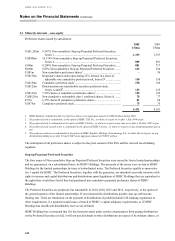 250
250 -
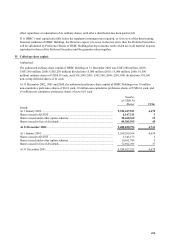 251
251 -
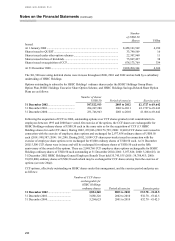 252
252 -
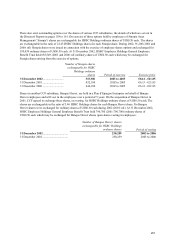 253
253 -
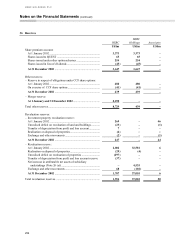 254
254 -
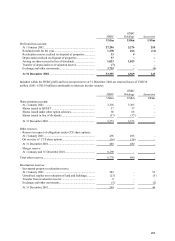 255
255 -
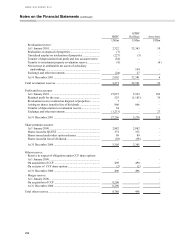 256
256 -
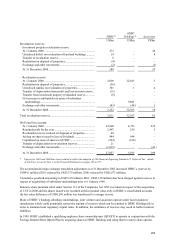 257
257 -
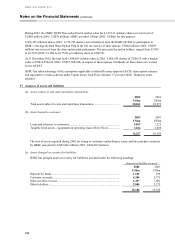 258
258 -
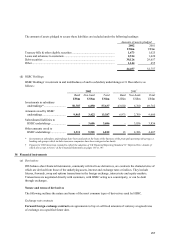 259
259 -
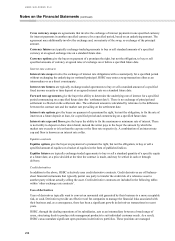 260
260 -
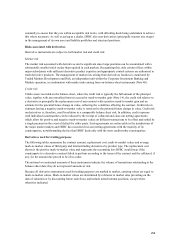 261
261 -
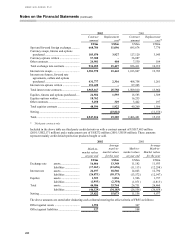 262
262 -
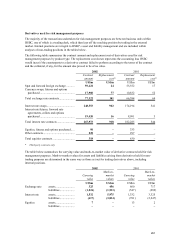 263
263 -
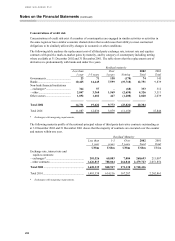 264
264 -
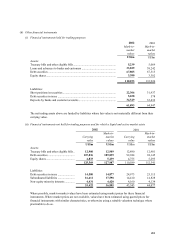 265
265 -
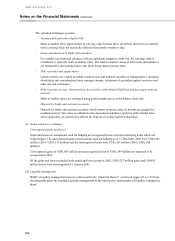 266
266 -
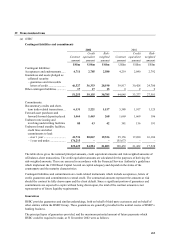 267
267 -
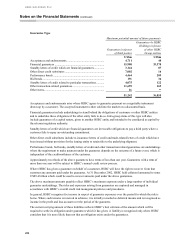 268
268 -
 269
269 -
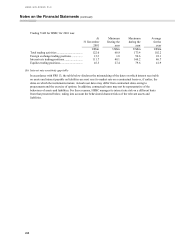 270
270 -
 271
271 -
 272
272 -
 273
273 -
 274
274 -
 275
275 -
 276
276 -
 277
277 -
 278
278 -
 279
279 -
 280
280 -
 281
281 -
 282
282 -
 283
283 -
 284
284 -
 285
285 -
 286
286 -
 287
287 -
 288
288 -
 289
289 -
 290
290 -
 291
291 -
 292
292 -
 293
293 -
 294
294 -
 295
295 -
 296
296 -
 297
297 -
 298
298 -
 299
299 -
 300
300 -
 301
301 -
 302
302 -
 303
303 -
 304
304 -
 305
305 -
 306
306 -
 307
307 -
 308
308 -
 309
309 -
 310
310 -
 311
311 -
 312
312 -
 313
313 -
 314
314 -
 315
315 -
 316
316 -
 317
317 -
 318
318 -
 319
319 -
 320
320 -
 321
321 -
 322
322 -
 323
323 -
 324
324 -
 325
325 -
 326
326 -
 327
327 -
 328
328 -
 329
329
 |
 |

HSBC HOLDINGS PLC
Notes on the Financial Statements (continued)
258
Cross currency swaps are agreements that involve the exchange of interest payments in one specified currency
for interest payments in another specified currency for a specified period, based on an underlying amount. The
agreement may additionally involve the exchange and, on maturity of the swap, re-exchange of the principal
amount.
Currency futures are typically exchange-traded agreements to buy or sell standard amounts of a specified
currency at an agreed exchange rate on a standard future date.
Currency options give the buyer on payment of a premium the right, but not the obligation, to buy or sell
specified amounts of currency at agreed rates of exchange on or before a specified future date.
Interest rate contracts
Interest rate swaps involve the exchange of interest rate obligations with a counterparty for a specified period
without exchanging the underlying (or notional) principal. HSBC may enter a swap transaction either as an
intermediary or as a direct counterparty.
Interest rate futures are typically exchange-traded agreements to buy or sell a standard amount of a specified
fixed income security or time deposit at an agreed interest rate on a standard future date.
Forward rate agreements give the buyer the ability to determine the underlying rate of interest for a specified
period commencing on a specified future date (the ‘settlement date’ ). There is no exchange of principal and
settlement is effected on the settlement date. The settlement amount is calculated by reference to the difference
between the contract rate and the market rate prevailing on the settlement date.
Interest rate options give the buyer on payment of a premium the right, but not the obligation, to fix the rate of
interest on a future deposit or loan, for a specified period and commencing on a specified future date.
Interest rate caps and floors give the buyer the ability to fix the maximum or minimum rate of interest. There
is no facility to deposit or draw down funds; instead the writer pays to the buyer the amount by which the
market rate exceeds or is less than the cap rate or the floor rate respectively. A combination of an interest rate
cap and floor is known as an interest rate collar.
Equities contracts
Equities options give the buyer on payment of a premium the right, but not the obligation, to buy or sell a
specified amount of equities or a basket of equities in the form of published indices.
Equities futures are typically exchange-traded agreements to buy or sell a standard quantity of a specific equity
at a future date, at a price decided at the time the contract is made, and may be settled in cash or through
delivery.
Credit derivatives
In addition to the above, HSBC selectively uses credit derivative contracts. Credit derivatives are off-balance-
sheet financial instruments that typically permit one party to transfer the credit risk of a reference asset to
another party without actually selling the asset. Credit derivative contracts are included in the following tables
within ‘other exchange rate contracts’ .
Uses of derivatives
Users of derivatives typically want to convert an unwanted risk generated by their business to a more acceptable
risk, or cash. Derivatives provide an effective tool for companies to manage the financial risks associated with
their business and, as a consequence, there has been a significant growth in derivatives transactions in recent
years.
HSBC, through the dealing operations of its subsidiaries, acts as an intermediary between a broad range of
users, structuring deals to produce risk management products to suit individual customer needs. As a result,
HSBC can accumulate significant open positions in derivatives portfolios. These positions are managed
